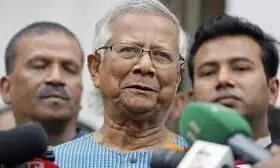
Nobel laureate Muhammad Yunus ready to lead interim government in Bangladesh
text_fieldsBangladesh's Nobel Peace Prize winner, Muhammad Yunus, has expressed his readiness to head an interim government, following the military takeover in the country.
This development comes after the ousting of Prime Minister Sheikh Hasina amid mass protests.
Yunus, 84, known for his pioneering work in microfinance, made the announcement in a statement to AFP, indicating his willingness to act in response to the country's needs and the courage of its people.
"If action is needed in Bangladesh, for my country and for the courage of my people, then I will take it," Yunus said, also calling for "free elections." His statement follows calls from student leaders for him to lead a caretaker government. Yunus has garnered significant respect from millions of Bangladeshis for his contributions to poverty alleviation, although he has faced opposition from the ousted Hasina.
Sheikh Hasina, who had been in power since 2009, faced accusations of election rigging and witnessed widespread protests demanding her resignation. Hundreds of lives were lost as security forces attempted to suppress the unrest, but the protests intensified, leading to Hasina fleeing the country by helicopter on Monday after losing military support.
General Waker-Uz-Zaman, the army chief, announced on Monday that the military would form an interim government, calling for an end to the violence. On Tuesday, President Mohammed Shahabuddin dissolved parliament, fulfilling a key demand of student leaders and the main opposition party, the Bangladesh National Party (BNP), which has called for elections within three months.
"In Dr. Yunus, we trust," wrote Asif Mahmud, a leader of the Students Against Discrimination (SAD) group, on Facebook.
The military has also made significant changes in its leadership, demoting generals seen as close to Hasina and dismissing Ziaul Ahsan, commander of the US-sanctioned Rapid Action Battalion. Former Prime Minister and BNP chairperson Khaleda Zia, a long-time rival of Hasina, was released from house arrest.
Following the military's takeover, Dhaka experienced a return to relative calm. Traffic resumed, shops reopened, and international flights at Dhaka's airport restarted, although government offices remained closed. The previous day's chaos had seen at least 122 people killed, as protesters launched revenge attacks on Hasina's allies, torched parliament, and destroyed TV stations.
Bangladesh's recent unrest began with protests against civil service job quotas and evolved into broader demands for Hasina's resignation. The military's intervention has now opened a path for potential political and democratic reforms. However, the international community, including key regional allies India and China, have called for calm and the restoration of stability.























